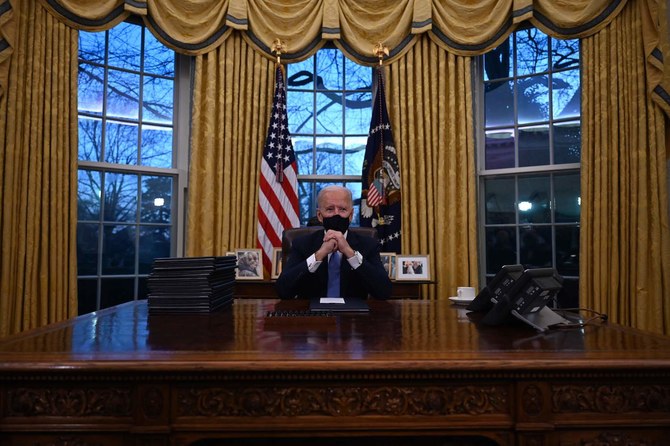We’ll always have Paris …

https://arab.news/bxc34
New US President Joe Biden has wasted little time in reversing many of his predecessor’s executive decisions. On inauguration day he signed an executive order to rejoin the Paris Agreement on Climate Change, and made good on his promise to cancel the Keystone XL pipeline that would have brought heavy oil from Canada down to the refineries on the Gulf of Mexico. Construction was already advanced and the executive order will sink a $1.1 billion investment in the project by the province of Alberta.
This shows that Biden means business when it comes to the climate agenda, for which he has appointed an impressive team. Former Secretary of State John Kerry will be special envoy for climate change, with a seat on the National Security Council and directly reporting to the president. The nominee to head the Department of Energy is former Michigan Governor Jennifer Granholm, and the Environmental Protection Agency will be headed by Michael Regan, currently North Carolina’s environment secretary. Biden nominated former BlackRock executive Brian Deese to head the National Economic Council, which matters because Deese was involved with Barack Obama’s climate policies and together with John Kerry helped build the consensus that led to the Paris Agreement.
The new administration has also vowed to preserve the Arctic National Wildlife Refuge, which Donald Trump opened to drilling for oil and gas, and it wants to suspend oil and gas leases on federal land.
So far, so good. Analysts at Climate Action Tracker calculate that the US will need to reduce emissions by at least 52 percent from 2005 levels by 2030 to achieve the Paris goal of limiting the rise in temperature to 1.5C over pre-industrial levels.
Analysts at Climate Action Tracker calculate that the US will need to reduce emissions by at least 52 percent from 2005 levels by 2030 to achieve the Paris goal of limiting the rise in temperature to 1.5C over pre-industrial levels.
Cornelia Meyer
Turning Biden’s ambitious $2 trillion clean-energy and infrastructure proposal into a deal that will clear Congress will be a challenge, given the razor-thin majorities in the Senate and the House. The $1.9 billion coronavirus stimulus bill may be an opportunity to include climate friendly projects.
It is hard to overestimate the importance of the leadership the US can bring to the climate change agenda. Without the last-minute face-to-face involvement of Obama and Kerry, convincing 190 countries to sign on the dotted line in Paris would have been unthinkable. Similarly, Kerry’s diplomatic acumen will be sought during this November’s COP26 conference in Glasgow.
As of 2019, America’s $3 billion was the largest contribution to the Green Climate Fund, which finances investment by poorer countries in renewable energy. This sort of financial support for developing nations is pivotal if the world is serious about the climate change goals in the Paris Agreement.
The overwhelming majority of the family of nations welcomes the US back into the fold of the Paris Agreement with open arms, especially since there is now overwhelming consensus that climate change is one of the biggest threats facing humanity. Most leaders also hope that even if there is a change in the executive branch down the road, the US will remain a part of the agreement.
- Cornelia Meyer is a Ph.D.-level economist with 30 years of experience in investment banking and industry. She is chairperson and CEO of business consultancy Meyer Resources. Twitter: @MeyerResources










































